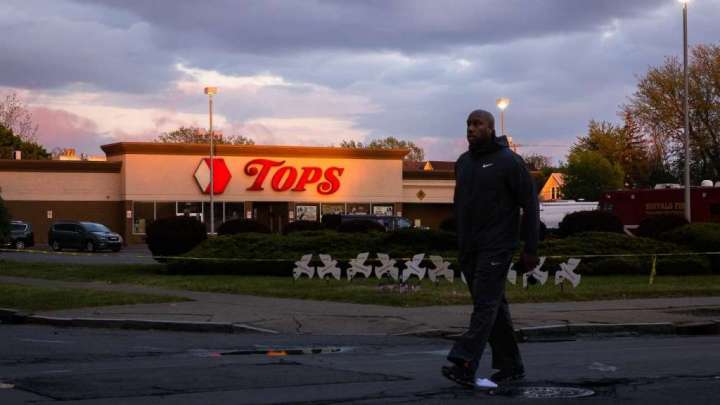Attorney General Merrick Garland had long planned a May 20 Justice Department event to commemorate the first anniversary of President Biden signing anti-hate crime legislation.
DOJ has new tools to fight hate crime. But it’s an uphill battle.

The massacre sent a defiant message to a ceremony meant to highlight the Biden administration’s fight against racist violence.
“We now gather in the wake of a horrific and painful reminder of the urgency and importance of this task,” Garland told a crowd in the department’s Great Hall last week.
“No one in America should fear violence because of who they are,” added Deputy Attorney General Lisa O. Monaco. “The department will not tolerate any form of terrorism, hate-based violence, or unlawful discrimination.”
The moment highlighted the difficulty of preventing hate crimes in a nation still rife with tension exacerbated by former president Donald Trump’s racist rhetoric. Garland used the event to present a new set of plans to tackle the persistent scourge.
After citing successful prosecutions in hate crime cases, Garland announced “noncriminal tools” to help prevent them. One is guidance for community organizations and local governments on how increased awareness of hate incidents “can be used as a tool for prevention and response.” He also announced a $10 million grant program to address hate crimes through state-run reporting hotlines and community programs.
“If it’s possible to even further redouble our efforts,” Garland said referring to Buffalo, “something like this can only cause us to do so.”
But efforts are redoubled every time the nation’s gun violence sickness explodes with mass fatalities, sometimes with hate as the motive.
And not far down Pennsylvania Avenue from Garland’s speech, Senate Republicans later blocked legislation that Democrats said could have given law enforcement more tools to address racist violence. The bill would have created bureaus in the FBI, Justice Department and Department of Homeland Security charged with reporting on the “threat posed by White supremacists and neo-Nazis.” Under the bill, an interagency task force also would focus on white racist infiltration into law enforcement agencies and the military.
Republicans opposed the measure, arguing it could be interpreted too broadly.
Gendron, the 18-year-old suspect in Buffalo, left no doubt about his motive.
His 180-page screed, The Washington Post reported, outlined his belief in a “great replacement” theory that White people would be overcome in part, in his words, by the “genocide of the European people.” This recalls the “Jews will not replace us” chants by racists at a deadly Charlottesville rally in 2017 who confronted counterprotesters. Following that, Trump comforted the white supremacists, saying there were “very fine people on both sides.”
Reported hate crimes are rising even as reporting from law enforcement agencies is declining, according to the Anti-Defamation League (ADL). That could indicate significant underreporting.
ADL’s updated review of FBI data says the number of hate crimes rose in 2020 to 8,263, the highest point since 2001 and a 13 percent increase over 2019. Hate crimes reported against Black people jumped 49 percent to 2,871. Yet at the same time, more than 60 jurisdictions with populations over 100,000 reported zero hate crimes, a circumstance ADL finds “simply not credible.”
Jake Hyman, an ADL associate director of communications, complained by email about “the persistent lack of complete and reliable data about hate crimes in this country. Data drives policy, and without an accurate assessment of the scope and nature of this problem policymakers and communities are left to develop solutions with one hand tied behind our backs.”
The FBI did not respond to questions about its hate crime data.
Garland’s toolbox to combat hate crimes does not include restraining inflammatory speech by elected officials.
After noting “only the perpetrator of a hate crime is responsible for the crime,” Michael Lieberman, a senior policy counsel at the Southern Poverty Law Center (SPLC), had pointed words about Trump’s influence.
“But we believe, strongly, that words matter — and words have consequences,” Lieberman added by email. “We believe President Trump’s divisive, polarizing rhetoric and executive actions helped create a climate in which individual perpetrators could feel emboldened to act.”
Hyman agreed, saying Trump’s words “created a climate that normalized anti-Asian, Anti-Muslim and anti-immigrant hate, which in turn energized and emboldened people to act. But hate existed before Donald Trump and it continues to thrive even though he’s out of office.”
In response, Trump spokesman Taylor Budowich blasted the SPLC and the media. “The disgraced and discredited Southern Law Center is a hate-based scam organization that masquerades as a think tank to sow division and wage partisan battles,” he said. “The fact that The Washington Post amplifies SLC’s agenda tells readers everything they need to know about both.”
Budowich said nothing about similar Anti-Defamation League comments.






